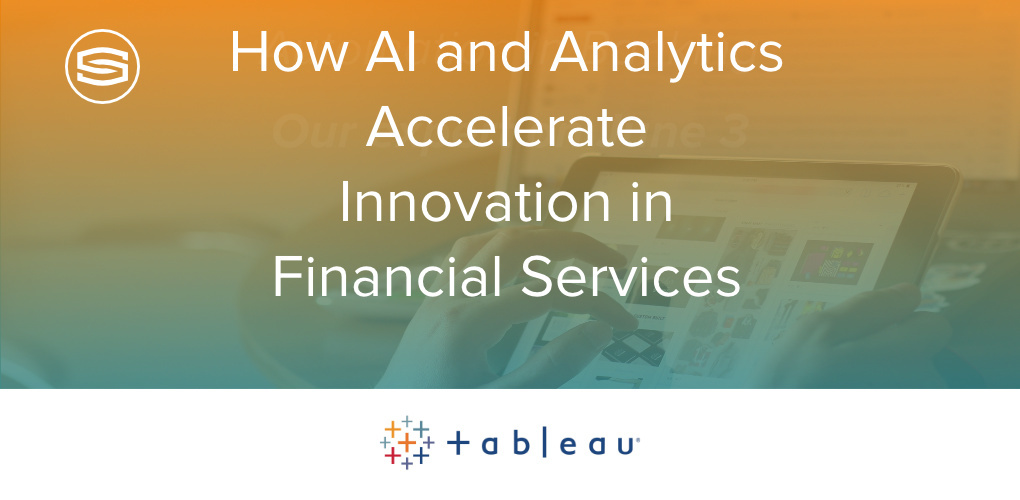
Insights & Opinions
How AI and Analytics Accelerate Innovation in Financial Services
Tue, 14 Dec 2021


The banking industry is fundamentally being transformed by AI (artificial intelligence) and analytics, for a couple of reasons. AI moved well beyond the hype cycle, according to François Zimmermann, EMEA Field CTO at Tableau, which is one of the reasons why today we see much more concrete examples of how AI and analytics transform banks.
This increased maturity democratised its possibilities. Until a few years ago, AI projects were deeply technical. Proof of concepts rarely made it into production because business owners insufficiently understood these developments.
This brings us to reason number two: AI and analytics have become a business opportunity instead of an IT playground. However, François noted: "We still aren't reaching enough parts of the business with AI. The main thing that's holding it back is that it really cannot be so technical that it needs a data scientist all the time."
So how can we overcome these last challenges to make AI reach its full potential?
To cover the entire spectrum on how banks can accelerate financial services innovation with AI and analytics, we partnered with Tableau for an Afterwork session where we invited:
- François Zimmermann, EMEA Field CTO, Tableau
- Thomas Peeters, Head of Benelux, SWIFT
- Rob Wesselink, Head of Innovation, Advanced Analytics & Data (IAAD) at Operations, ABN AMRO Bank NV.
Garbage in, garbage out
Useful AI and analytics go hand in hand with quality data, an excellent level of data accuracy and consistency.
SWIFT is putting so much emphasis on the ISO20022 migration for precisely that reason. ISO20022 is an ISO standard for electronic data interchange between financial institutions. Thomas explained that by migrating the financial services industry to ISO20022, transaction data would become richer, more uniform and accurate.
This evolution will ignite a new wave of innovation. It will help banks improve their fraud department's efficiency, reduce false positives in transaction screenings, gain better insights into their transaction flows and customers and increase more instant and straight-through processing of their cross-border payments.
Does this mean banks do not have enough data today? Of course not. They just lack the right data every once and a while.
"Mining sufficient data is not an issue in banks. There's plenty of data available. We almost drown in data availability", explained Rob. "A bank's challenge is having the right data at the right moment with the right people, and also governing that properly, so those decisions based on data are always made consistently".
Governance is a critical aspect of achieving this. Rob: "For a couple of years, ABN AMRO made a huge effort to govern data in a smart way to get speed and agility in an exploration phase of a new project. After all: a data analyst or a data scientist wants to test and build something quickly.
But as soon as you go to production, you also need stability and quality."
Yes, AI can help with that. ABN AMRO has logarithms running to detect potential issues and measure data quality.
They are not the only ones. Perhaps not immediately linked to dirty data, but to outliner detection, François explained that at Tableau, they are working on a Data Change Radar that helps people to manage their KPIs better. Whenever an unusual KPI is detected outside the expected range, this tool will proactively notify you and say what you should follow up on at next time you log on to the system.
AI and Analytics are business enablers
Organisations that genuinely grasp the opportunities of AI and analytics are the ones - and I will use a quote from someone in the audience of our session - that "use data to improve the company's worth and the user experience. Improving the data is key today. After all: it's the user experience and the client experience with the data that you're mining."
To achieve that mindset, organisations must put AI and analytics in the heart of their business lines, not next to them. Positive signs show that the industry evolved from a data-centric approach to AI to a customer-centric approach. ABN AMRO is one of them.
Rob explained: "The challenge today is that you need business involvement. You need business people driving what needs to be done by IT and what needs to be done with the data. We have seen this shift within the bank. A couple of years ago, clever IT people, data scientists were developing cool proof of concepts, and everybody was cheering about it. But it was never used because no business person was involved in the development, and no one wanted it."
They missed a business sponsor.
François' vision is: "You need data-science-led uses of AI for high precision use cases, those will always be technical. But you also have a number of use cases that the lines of business should own. We call this business science."
He continued: "Only when you understand precisely who the data consumers are, can you work out what granularity of data you need to provide those insights and whether or not someone is authorised to do it. So I think this use-case-first approach answers many questions around data quality and granularity and also privacy".
Rob added to the debate on privacy, saying: "There's a big responsibility for both business and IT to take that into account early. Within ABN AMRO, we formalise this in terms of data owners, data users and data consumers. They each have different responsibilities. So basically, privacy is a shared responsibility for all employees within the bank."
Conclusion
We discussed a lot more about getting the right data right. The only way to achieve that is to frame what you want to achieve from the very beginning. That comes with new challenges, like the risks of AI bias etc., but by framing it well, the problem gets more digestible.
As Francois explained: "You have to know the use case really intimately to make those decisions about data privacy and quality, granularity and currency to work out whether or not you can actually answer that question."
I really enjoyed the session, and many people with me, according to the feedback I got. Because AI is getting so deeply in the business side of banks and because it has such a profound impact on the future of banking, I am convinced we'll have more sessions like this to come.


